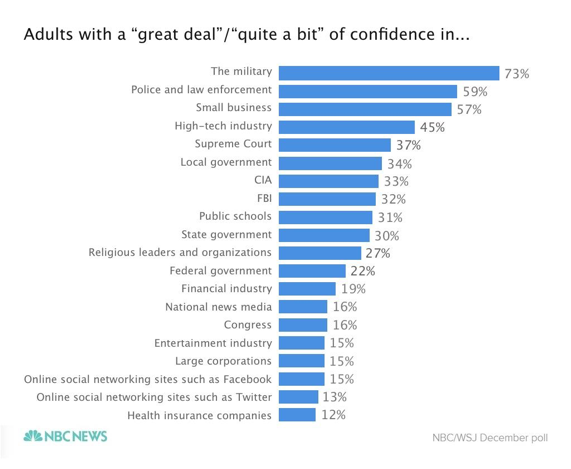Today, Donald J. Trump has been sworn in as the 45th president of the United States. President Trump, who prior to his new political life was better known as being a businessman and a reality TV star, hardly fits the traditional mold for American presidents—or for any American politician, for that matter. His campaign was an unusual mix of showmanship, negativity, xenophobia, populism, and entertainment. It was unlike any presidential campaign the country has ever seen before, and in the end it catapulted him into White House.
Some have claimed that Trump’s victory can be viewed as a marked shift away from politics as usual and the policies of the Obama administration. So when it comes to approval ratings, one would assume that the incoming president would enter with higher marks than the outgoing one. According to a recent NBC News/Wall Street Journal survey, this is hardly the case.
Trump enters office with a historically low approval rating—only 38 percent of Americans have a favorable view of Trump, while 48 percent view him negatively—a stark contrast to Obama’s 71 percent approval rating when he assumed office in 2009. When it comes to President Trump’s proposed agenda, an estimated 37 percent of Americans agree with his initiatives, while 40 percent disagree with his proposals.
Additionally, the public remains divided in its perception of the two major political parties. The January NBC News/Wall Street Journal survey found that 35 percent of respondents view the Republican Party positively, while 43 percent view it negatively. Almost identically, 35 percent view the Democratic Party positively while 44 percent view the Democrats negatively.
While the notion that Trump’s election was a repudiation of the institution of Washington by Americans frustrated with politics as usual, over the last couple of months we’ve begun to see that frustration extend to institutions more broadly.
According to the December NBC News/Wall Street Journal survey, the military, law enforcement, and small business are generally viewed positively, with over 50 percent of the public having a “great deal” or “quite a bit” of confidence in them; however, no other U.S. institution included in the poll garnered nearly as much support. In fact, institutions like the CIA, FBI, and Congress have only 33 percent, 32 percent, and 16 percent, respectively, of American adults having a “great deal”/“quite a bit” of confidence in them.
Similarly, beyond government institutions, the same survey shows that roughly one-quarter of the population has “very little” or no confidence “at all” in national news organizations, health insurance companies, and the entertainment industry. According to the survey, only a combined 27 percent have a “great deal”/“quite a bit” of confidence in religious organizations and leaders, while the financial industry garners only 19 percent.

Trump famously used his social media platforms to communicate directly with the public throughout the 2016 presidential campaign, so it might seem counterintuitive that both Facebook and Twitter—Trump’s preferred modes of communication—are viewed negatively by the public. An estimated 50 percent of the public has little to no confidence in online social networking sites like Facebook. Twitter is viewed similarly at 48 percent. Speaking of Twitter, in a new poll, 47 percent of Republicans disapprove of President Trump’s use of the social media platform. Add Democrats and independents to the mix, and that number increases to 69 percent (perhaps we have found an uniting issue?).
Americans also seem to be united in their view that Trump is not a typical Republican, with only 8 percent of respondents identifying him as such, though they remain divided—43 to 38 percent—as to whether that’s a good thing. There appears to be widespread agreement that Trump and Congress should prioritize keeping U.S. jobs from going overseas, with 78 percent of respondents saying doing so should be a priority in 2017. The campaign issue that garnered the most significant opposition is building a wall along the U.S.-Mexico border, with 55 percent of respondents saying that effort should not be pursued.
If the mood in America is divided, the mood of our neighbor to the south is less so. A January poll of 1,000 Mexican residents in the Mexican daily newspaper El Universal found respondents largely despondent when considering Trump’s presidency. More than three-quarters anticipated that relations with the United States would get “much worse” during the new administration. Nearly two-thirds said they believe Trump’s wall will be built, and more than one-third predicted that the new president would force Mexico to pay for it. Taking Trump at his word, they were particularly united in predicting dire consequences for immigrants living in the U.S. Ninety-two percent said discrimination against Mexican immigrants would increase, and 95 percent said there would be more deportations. While Trump has promised jobs, Mexican respondents understood that he doesn’t mean jobs in Mexico or jobs for immigrants in the U.S. More than four-fifths said immigrants would not be able to get jobs in America under a Trump administration. In a sign that its own political leadership may be ripe for dramatic change, 65 percent said the Mexican government has not done enough to manage its relationship with the U.S.
Americans may not be decided on President Trump, but if Mexico is any indication, the world seems decidedly skeptical of his direction and leadership.